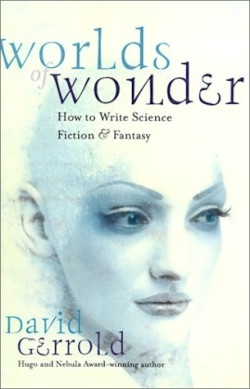Worlds of Wonder
How to Write Science Fiction and Fantasy
“The writer has to know what is in every nook and cranny of the story,” Theodore Sturgeon once said. “You don’t have to write it all down, but if you know what’s there, it’ll show.”
Gerrold delves into the nooks and crannies of science fiction and fantasy and offers the components of good writing in an effective and entertaining way. He presents exercises with the same air as a mother with eyes in the back of her head. “Actually take the time to do this,” he admonishes at the beginning of the first exercise. He’s been there. He knows that most people’s first instinct will be to just think it through in their heads, but also that it will be much more effective if actually written out.
Worlds of Wonder begins with the early sparks of writing: how to develop both the idea for the story and the drive to put it on paper. It then moves from development to structuring, including such topics as how to build a world for the story to take place in: “Planets are not ‘Earthlike.’ Some writers are lazy.”
The last third of the book presents ideas for using the English language itself. In addition to the usual discussions of simile, metaphor, and not using too many adjectives, Gerrold also introduces stylistic concepts such as metric prose and E Prime (the act of writing without using any form of the verb “to be”). Even if one thinks that some of these concepts are strange, trying them as an exercise will undoubtedly cause the writer to look for new ways of writing. It will remove the comfort zone and refresh their style.
Gerrold also touches on some subjects not discussed by many other how-to-write authors, such as sex scenes. It should be noted that the steamy example provided in that particular chapter may need parental guidance for younger audiences.
The Star Trek episode “The Trouble with Tribbles,” about a fur ball invasion of the Enterprise, is Gerrold’s most widely known work to date, but his credentials include almost thirty novels, two anthologies, two nonfiction books, a short story collection, and approximately twenty-five television scripts. Within his first four years of writing he was honored with three Hugo and three Nebula nominations.
This experience combines with his straightforward, yet easygoing style of conveying just what it takes to be a writer. Though the focus is on science fiction and fantasy, the advice presented is useful for writers in any genre.
Gerrold maintains that a writer writes to make a difference in this world. He challenges the aspiring author with the question, “What do you want to say to the rest of your species?”
Reviewed by
Christine Canfield
Disclosure: This article is not an endorsement, but a review. The publisher of this book provided free copies of the book to have their book reviewed by a professional reviewer. No fee was paid by the publisher for this review. Foreword Reviews only recommends books that we love. Foreword Magazine, Inc. is disclosing this in accordance with the Federal Trade Commission’s 16 CFR, Part 255.

